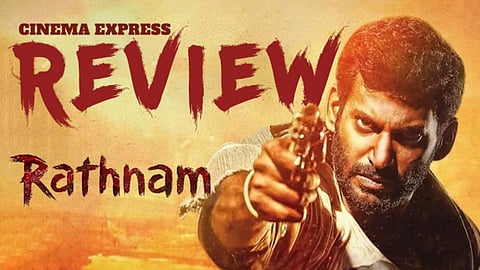Rathnam Movie Review: A hyper-violent family drama with an overstuffed screenplay
Rathnam(1.5 / 5)
Indian mass masala is perhaps the only genre in the world that gets away with chilling violence and still gets labelled as a family entertainer and professes ‘family values’ and features powerful sentimental scenes as a tonal buffer between action sequences. While we are mostly used to violence in such films—and have even learned to enjoy them to an extent—Rathnam manages to out-gore even our most violent commercial film. The bloodshed in this film is needlessly excessive. Rathnam begins with a bandit trio who topple a bus and then steal money and jewels from their half-conscious victims. Devoid of patience and empathy, these criminals even slash the ears to remove earrings, cut off fingers with rings on them, and stop short of beheading them to remove gold chains. But you almost expect that to happen because that’s the over-the-top bar we start to expect by then.
Director: Hari
Cast: Vishal, Priya Bhavani Shankar, Yogi Babu
Rathnam has an acute fascination with mutilation because there are several such scenes where almost every part of the body is cut off. This might have been interesting if it served as a motif or if it is the bad guys’ (or the protagonists’) signature move but no, we see severed limbs as many times as we see a supporting character like Yogi Babu. Ironically, at least the severed limbs make you grimace, which means you felt something, the same could not be said for the comedian’s scenes. Almost every attempt at humour drains the film of any little charm or energy it previously accrued. The fact that these comedy scenes are awkwardly placed does not help either. For instance, we are shown a squirm-worthy scene that depicts a sexual assault and immediately afterwards we are introduced to Yogi Babu bursting onto the frame to display his comedic shenanigans. It is like being dunk into a bucket of water until you almost drown and then you are immediately pulled out to smile for the camera.
However, Rathnam is not devoid of Hari’s trademark ingenuity, even though they only appear in brief flashes. How the strength of writing and its detailing suffers deformity at the hands of careless staging, is demonstrated well enough in a scene towards the end of the film. Before heading out to face the villain for a final showdown, Rathnam (Vishal) hurriedly helps himself to some home-cooked food made by Malliga’s (Priya Bhavani Shankar) mother, and who makes a heartfelt appeal to make Rathnam dine at their house. As an orphan who lost his mother at a young age, Rathnam finally feels the warmth of a family at Malliga’s house, this scene poignantly captures Rathnam’s yearning for maternal love. This also tells you that he is going to go all-out on the final battle, and is ready to not come back alive. However, such a brilliant demonstration of character depth is preceded by a forgettable exchange of lines between Rathnam and Malliga. That along with the pacing, and the way the scene is staged, makes the ‘last supper’ scene look like a parody of itself. There are many such tonal transgressions.
While Hari’s signature pace is all over the film, the scenes lack any kind of tension. For example, in a pivotal moment following a lengthy chase sequence, Rathnam and Malliga are surrounded by the villain’s goons. In every action-entertainer, the lead characters are eventually trapped in an impossible situation, and before the audience realises how they could escape, the story needs to deliver a dazzling, convincing, and a non-generic way for the protagonist to get out of the threat. However, in Rathnam, while we wait with bated breath to see how Rathnam escapes, he just simply takes a gun and shoots them all. Whenever Malliga—who almost makes you feel nostalgic for how much of an old-school damsel she is—gets into trouble, before you even feel any tension, Rathnam jumps in to save her and kills the scene. Composer Devi Sri Prasad makes sure that the tone of a scene is all over the place. A chilling crime or a gripping action scene has melodramatic TV serial-like music playing over it. The thought behind this is commendable because we understand the composer does not want the scenes to glorify violence, he does not want to give you generic ‘action music’. However, the overstuffed music only ends up pulling you out of the scene.
Rathnam’s issues are one of excess. The plot threads, the music, the violence, the tedious action, and multiple expositions that serve little to the overall story, are all excessive. The film rides on a fairly engaging premise but crumbles under the weight of a needlessly dense screenplay. Vishal’s lack of range does not help either. We see traces of what it could have been, a consummate Hari film. However, Rathnam only ends up enlarging everything we choose to overlook in Hari’s better films.

